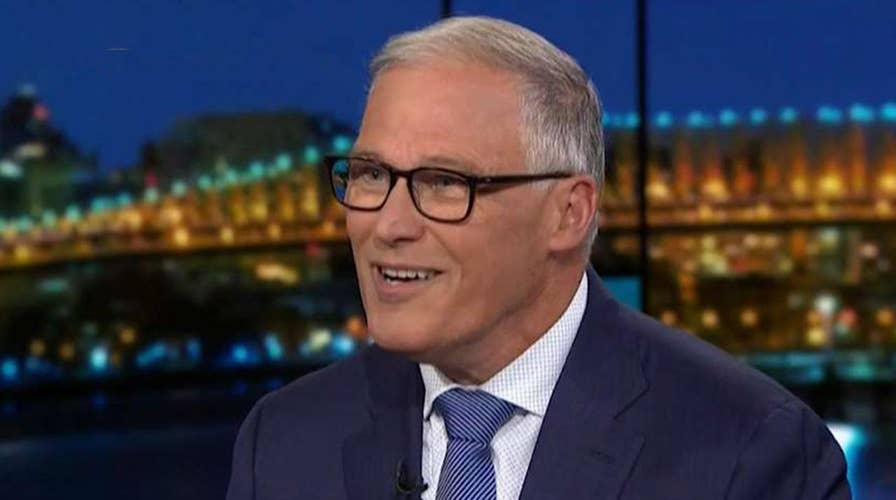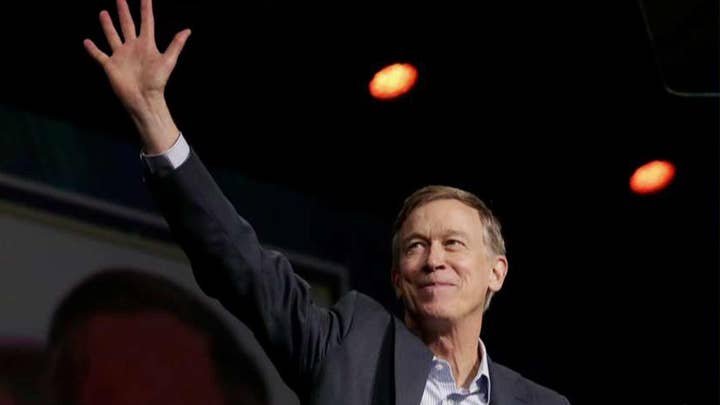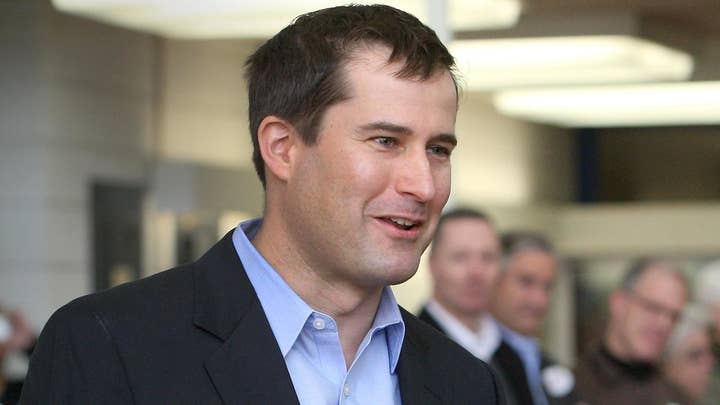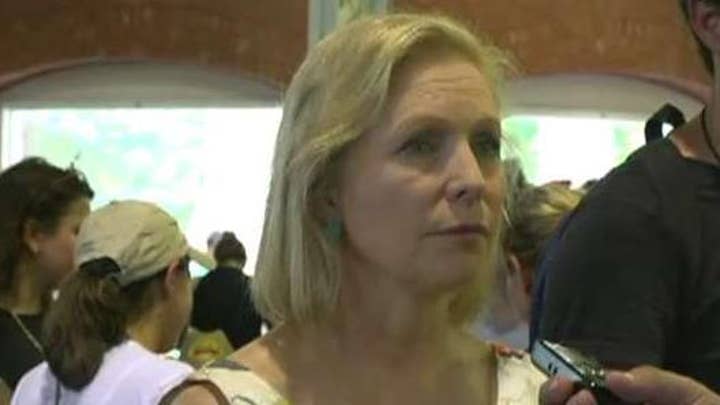Former Democratic presidential candidate Jay Inslee quits race after staking campaign on climate change
With Inslee dropping out to pursue a third term as Washington state's governor, Bernie Sanders looks to take up the climate change baton; Peter Doocy reports from Des Moines, Iowa.
It’s gut-check time in the race for the Democratic presidential nomination.
Three White House hopefuls have called it quits over the past two weeks and the winnowing of the 2020 field could continue later this week, as it’s all but certain that around half of the remaining contenders will fail to make the stage for next month’s third round of nationally televised primary debates.
SOME 2020 DEMS FUME AT DNC OVER DEBATE CRITERIA CRACKDOWN
The deadline to reach the qualifying thresholds laid out by the Democratic National Committee (DNC) is Wednesday.
“The debates force candidates to decide whether they’re viable to continue or not,” veteran Democratic strategist Jesse Ferguson said. “The debates put that decision front and center for the candidates and force them to reckon with whether they have a path to victory.”
In the past two weeks, former Gov. John Hickenlooper of Colorado, Gov. Jay Inslee of Washington, and Rep. Seth Moulton of Massachusetts all dropped out of the White House race. All three immediately moved on to down-ballot races. Hickenlooper launched a bid for the Democratic Senate nomination in Colorado, while Inslee and Moulton announced re-election bids for their respective offices.
While there’s a strong chance other long-shots may also bow out later this week, others may give their candidacies another month. The criteria to make the cut for October’s fourth round of debates is the same as the third, giving the lower-tier candidates another month to reach the debate stage.
“I’d like to see candidates stay in – at least until the fourth debate – because there’s a good chance some of them will qualify for October and I hope some of them will do that so people have a chance to see them,” said Kathy Sullivan, a DNC member from New Hampshire. “There are some really great candidates who either got in late or haven’t got the coverage that some of the others have who I’d like to see them have the chance to introduce themselves.”
But Sullivan, a former state Democratic Party chair, acknowledged that “at some point, obviously closer to the end of the year, people have to do a gut check on money and whether or not they have the ability to move on.”
THE LATEST FROM FOX NEWS ON THE 2020 PRESIDENTIAL CAMPAIGN
Ten candidates have already qualified to make the stage for the third and fourth debates. They are former Vice President Joe Biden; Sen. Cory Booker of New Jersey; South Bend, Ind., Mayor Pete Buttigieg; former Housing and Urban Development Secretary Julian Castro; Sens. Kamala Harris of California and Amy Klobuchar of Minnesota; former Rep. Beto O’Rourke of Texas; Sens. Bernie Sanders of Vermont and Elizabeth Warren of Massachusetts; and tech entrepreneur Andrew Yang.
Billionaire environmental and progressive activist Tom Steyer has reached the fundraising threshold – campaign contributions from 130,000 individual donors – but is just short of registering at 2 percent or higher in four qualifying polls (he's reached that mark in three qualifying polls). Rep. Tulsi Gabbard of Hawaii has also hit the donor threshold and is two polls shy of making the cut.
If Steyer and Gabbard fail to make next month’s debate, it’s a sure bet they march on and qualify for October’s fourth round.
Sen. Kirsten Gillibrand of New York is close to reaching the fundraising threshold but has only hit two percent on one qualifying poll. An optimistic Gillibrand told Fox News last week, “I’m planning on making this round.”
But Gillibrand raised eyebrows by telling Fox News and the Washington Post in separate interviews that she’s open to serving as her party’s vice presidential nominee if her White House bid fails.
“I’m here to serve,” she said. “I can serve in any capacity.”
Rep. Tim Ryan of Ohio – who’s not close to qualifying for the upcoming debates – is also vowing to stay in the race.
“We’re going to keep going. We’re getting momentum,” Ryan said Friday.
Former Rep. John Delaney of Maryland - another lower-tier more moderate Democratic contender – pledged emphatically that, “I’m going to stick around, period.”
Delaney acknowledged that he wouldn’t make the third round of debates, saying “that’s fine,” and added that "we feel good about the fourth debate.”
While both Ryan and Delaney admitted that missing a chance to speak to the millions expected to watch next month’s prime time debate won’t help their chances, they also noted that there are still more than five months to go until the first votes will be cast in Iowa and New Hampshire.
“I think in many ways this thing is just getting started,” Delaney told Fox News. “Americans are finally dialing in on the Democratic primary and I think we’ve got a long way to go.”
Delaney, a multi-millionaire who’s self-funding much of his White House bid, doesn’t have to worry about running out of campaign cash. But that’s not the case with many of the other longer-shots.
However, Ferguson – who served as a senior spokesman for Hillary Clinton's 2016 presidential campaign – noted social media has changed the dynamics for candidates and their campaigns.
“Twenty years ago once donors decided your campaign was not viable, you couldn’t keep the lights on," he said. "Today these campaigns have built a grassroots donor base that will allow them to sustain themselves and give them the opportunity to capitalize on a moment that may or may not come. And in the social media era, a moment can change everything. So writing any of these campaigns off prematurely is a mistake.”
Sullivan also said it’s too early to declare some candidates dead in the water – especially giving the record-setting size of the field and the chaotic campaign cycle.
CLICK HERE TO GET THE FOX NEWS APP
“The fact that somebody’s numbers right now may be low doesn’t mean they don’t have a chance at this thing,” she said.
While the field is likely to narrow over the next couple of months, some candidates who will likely never be viable may stick around. As a Democratic consultant who spoke to Fox News anonymously put it: "The ones who should get out are the least likely to get out because they’re the ones running simply to have their microphone turned on and voice listened to, not because they think they’re going to be the nominee.”
Fox News’ Andrew Craft contributed to this report.

















































